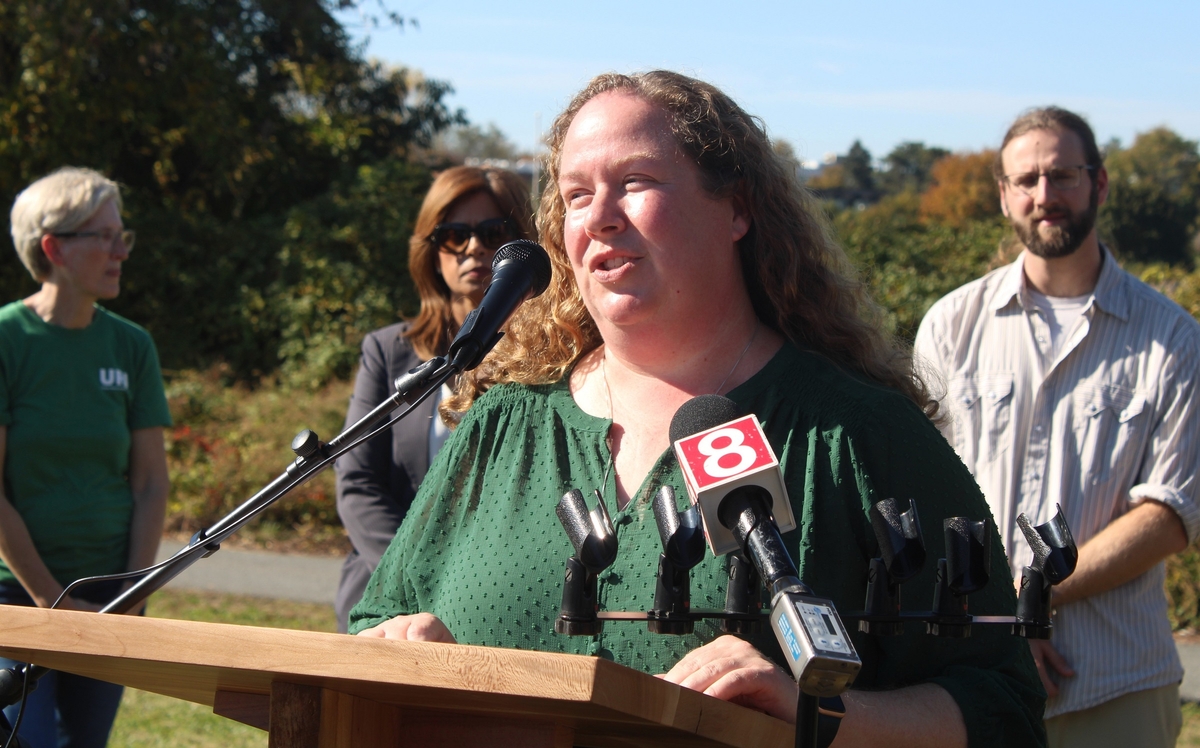
Thomas Breen file photo
City Chief Arborist Anastasia Mixsell.
New Haven may soon have an urban forest management plan.
But what does that mean?
The city’s Board of Park Commissioners had that same question on Wednesday night during its latest regular meeting at 720 Edgewood Ave.
Commissioners asked that question after New Haven’s Chief Arborist and Tree System Coordinator Anastasia Mixsell told them that the city had won a $360,000 grant from the United States Forest Service as part of the Inflation Reduction Act’s $1.5 billion investment into expanding urban forests.
Think of East Rock or any other parks in New Haven with large collections of trees, Mixsell said. Those are urban forests.
With the urban forestry plan, the city is hoping to have a strategic vision and roadmap for how to plant trees equitably and sustainably across the city’s greenspaces. Through the process, Mixsell believes the city might update its ordinances around trees, where they’re planted, and how they are maintained.
Mixsell also hopes to hire a consultant who will study the city’s greenspaces to determine if the city can improve how it takes care of trees and how it decides where and when to plant more trees. Mixsell plans on including community stakeholders throughout the process of creating the urban forestry plan.
“We’re going to talk to people to see what they really envision for their neighborhoods and areas because everyone has different feelings about trees, and so making sure everyone feels heard and a part of the process,” Mixsell said.
Parks Commissioner Harvey Feinberg asked Mixsell how much she plans on spending on the consultant and the specifics of their job. Mixsell told him and the commission that she has already started receiving estimates from companies interested in working with New Haven, and she expects the consultant to cost $150,000, pending a formal RFP process.
That price tag also includes a plan to better map the city’s trees through a place like the University of Vermont’s Spatial Analysis Lab, which did a similar mapping about a decade ago. With this mapping, the consultant will take high-resolution aerial images that will help the city identify all of the species of trees in the city as well as what is owned by private landowners and what is owned by the city.
With the remaining funds, Mixsell hopes to invest in her staff of roughly 10 tree caretakers. She said some of them wish to receive their arborist licenses, and she also hopes to use some of the funding for larger group training and certification processes.
Mixsell is also looking into a formal partnership with either the University of Connecticut or Yale for students to come for work studies or internships with her department.
“I would have loved an opportunity like this in college, and I would love to have an intern right now,” Mixsell said.

At Wednesday's parks commission meeting.
New Haven is one of just 300 cities to win grant funding from this U.S. Forest Service program, and the fund is the first of its kind federally. It’s also the first time New Haven has received outside funding to maintain its urban forests.
The $360,000 grant also comes alongside a $3 million federal grant from the U.S. Department of Agriculture’s Urban and Community Forestry Grant Program to the Urban Resources Initiative, a Yale-affiliated nonprofit that plants, trims, and maintains city trees, to plant an additional 2,500 trees across New Haven over the next five years. This planting push is also part of the Inflation Reduction Act’s push to expand urban canopies in disadvantaged communities.
New studies have found that communities of color and impoverished neighborhoods have fewer trees which means that they are more likely to be urban heat islands where temperatures will be higher as the planet continues to warm, and cities like New Haven face even hotter summers.
Those same studies have also begun to link higher rates of asthma and pollution in disadvantaged communities as trees are Earth’s best natural air filters. In New Haven, the Environmental Justice neighborhoods that will see most of the tree plantings are Newhallville, Fair Haven, Dixwell, the Hill, and Dwight.




As I read the article I wondered if trees knew they were part of the equity drama. .... but seriously, I hope some thought will be given to how to plant trees rather than by just which interest group needs to be mollified. Just plopping a tree by asphalt or tree belt is really not enough and often not good for the tree.
I recommend this group read THE HIDDEN LIFE OF TREES by Peter Wohlleben---- truly a beautiful book to read... I think people would be amazed at what trees do and how alive they are!!